#Woolly hedgenettle
Explore tagged Tumblr posts
Text
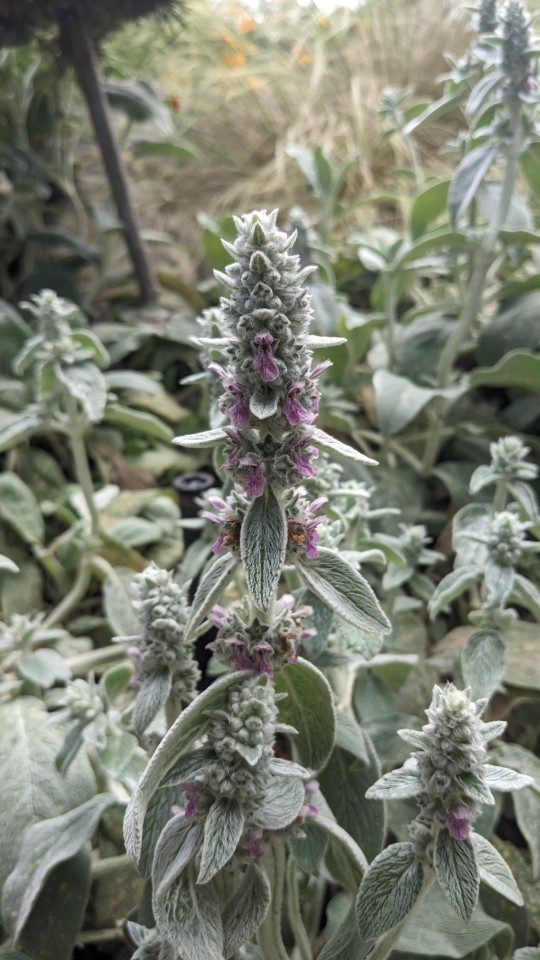
Stachys byzantina 'Silver Carpet' / 'Silver Carpet' Lamb's Ear at the Sarah P. Duke Gardens at Duke University in Durham, NC
#Stachys byzantina 'Silver Carpet'#Stachys byzantina#Stachys#Lamiaceae#Silver Carpet Lamb's Ear#Lamb's Ear#lambs ear#Woolly hedgenettle#Plants#Flowers#Nature photography#photographers on tumblr#photography#Sarah P. Duke Gardens#Duke Gardens#Duke University#Durham#Durham NC#North Carolina#🌺🌻
12 notes
·
View notes
Text



Day 15! Superfine merino and peduncle silk. This one came out a really lovely subtle silvery green, and is also maybe the nicest yarn I have ever touched. It's not necessarily the softest or the fuzziest but it's just. so nice to touch.
It's hard to describe. Have you ever touched that plant? The one with the soft fuzzy leaves? Lamb's ear, woolly hedgenettle, stachys byzantina? It feels like the most perfect leaf of that you've ever touched. I'm in love with it. I want this to be socks and gloves and hats and scarfs and a full body suit. Which I think you would all agree would be a super normal and cool outfit to wear ✨
(day 14)
#wowfa24#spinning yarn#handspinning#hand spinning#handspun#spinning#yarn#fiber arts#world of wool fiber advent#allonsybadwolf#my handspun
31 notes
·
View notes
Note
she chokes back a laugh, turning away from the display. her face flushing just a bit. as she calms down just a bit before responding, moving the flowers gently to the side.
“yup, definitely dangerous” she affirms, moving onto another aisle. settling down near the lamb’s ear or woolly hedgenettle plants, gently touching the soft leaves. “i suppose i shouldn’t distract you from your work any further. how much do I owe you for this stem of snapdragons?” she asks politely, reaching for her purse.
—elle
"Not necessary." He responds with a nod. "First time customers get a free stem, always."
It was the truth but, he hoped it held more warmth than usual.
"Actually, Miss..." he returns behind the counter and grabs some floral wire, expertly weaving it within the stem to reinforce it.
"Well since I already threatened you with it, may as well disarm me. For the safety of Linkon." He moves to find her within the aisle and hands her over the reinforced stem and returns to his stead.
"I hope to see you again soon, Pretty Miss. But you're welcome to stay as long as you like. If you see anything that interests you, let me know."
2 notes
·
View notes
Text
I got tagged by @igglemouse so let's do this!
OC: Rose Volkov-Woods
ANIMAL: bear
COLORS: Burgundy
MONTH: October
SONGS: Road to Joy
NUMBER: 3
PLANTS: woolly hedgenettle (lamb’s ear)
SMELLS: clean laundry and citrus
GEMSTONE: moonstone
TIME OF DAY: dusk
SEASON: Fall/ Autumn
PLACES: Library or small cafe
FOOD: cinnamon buns
DRINKS: Chai
ELEMENT: Earth
ASTROLOGICAL SIGNS: Taurus
SEASONINGS: cinnamon
SKY: the sky at sunset
WEATHER: eye of a hurricane
MAGICAL POWER: stubbornness
WEAPONS: people underestimating her
SOCIAL MEDIA: Tumblr
MAKEUP PRODUCT: lip balm
CANDY: dark chocolate
METHOD OF LONG DISTANCE TRAVEL: train
ART STYLE: Pre-Raphaelite
FEAR: making the wrong choice
MYTHOLOGICAL CREATURE: Phoenix
PIECE OF STATIONARY: planner
THREE EMOJIS: 🪭🌸☕
CELESTIAL BODY: Moon
I am going to tag @sirianasims @simmysunset @rebouks @lynzishell and anyone else who wants to do it. If you've already done it sorry!
6 notes
·
View notes
Text
Woolly Hedgenettle — FOTD Jan 08
Hi all My latest post for Cee’s FOTD. Woolly Hedgenettle I did an AI watercolour transformation for these nettles.Woolly Hedgenettle — FOTD Jan 08

View On WordPress
0 notes
Text
Woolly Hedgenettle -- FOTD Jan 08
Hi all 👋 My latest post for Cee’s FOTD. Woolly Hedgenettle I did an AI watercolour transformation for these nettles.
0 notes
Text
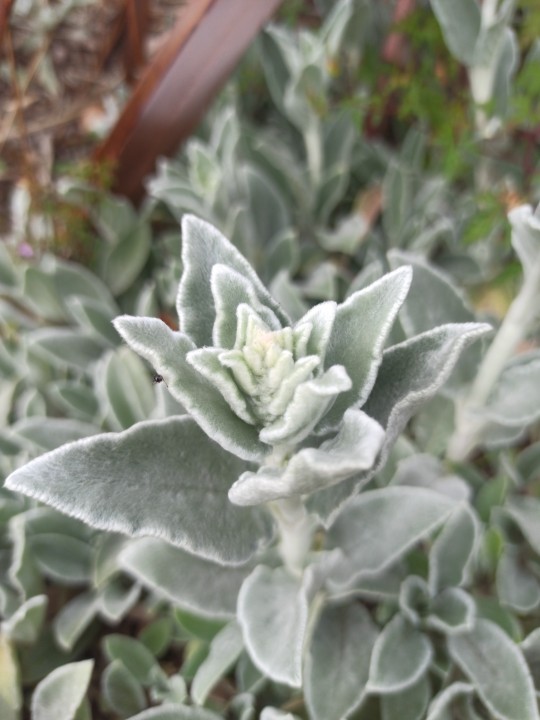
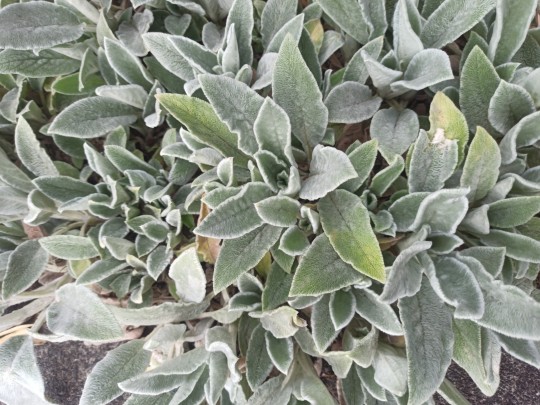
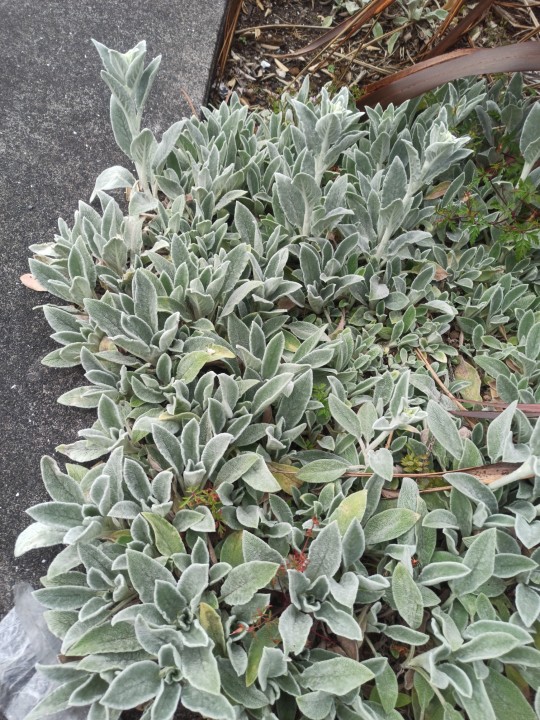
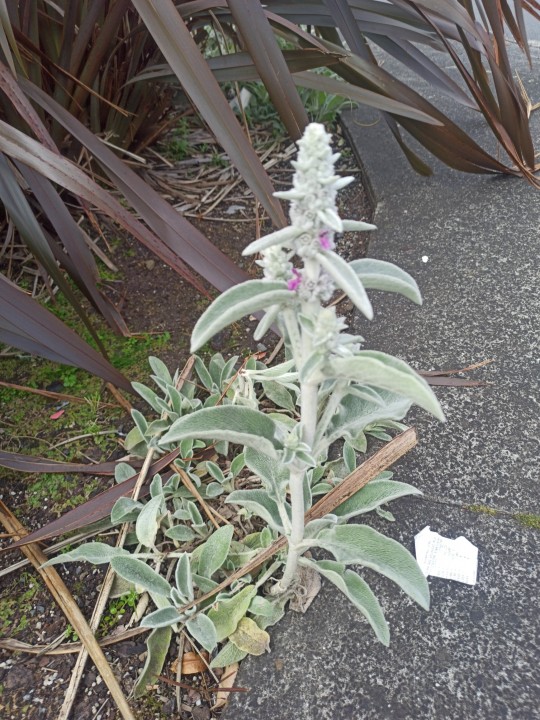
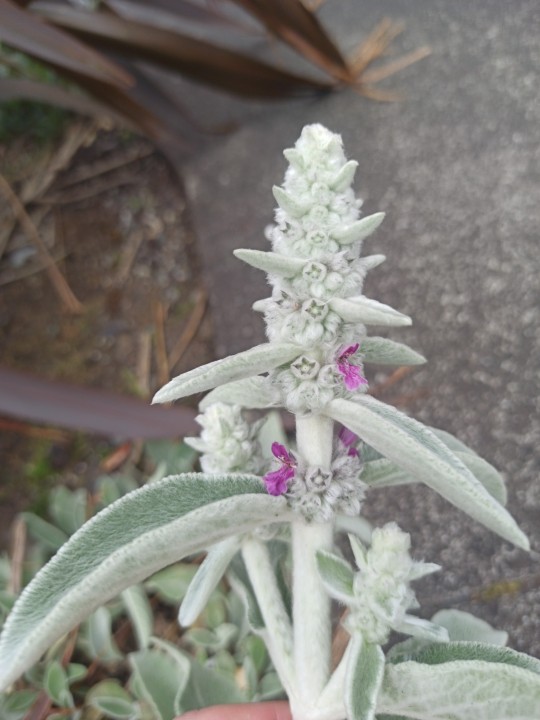
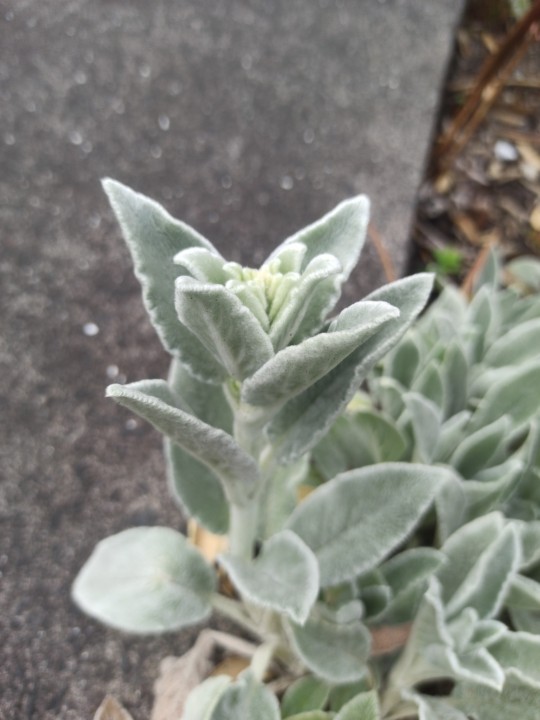
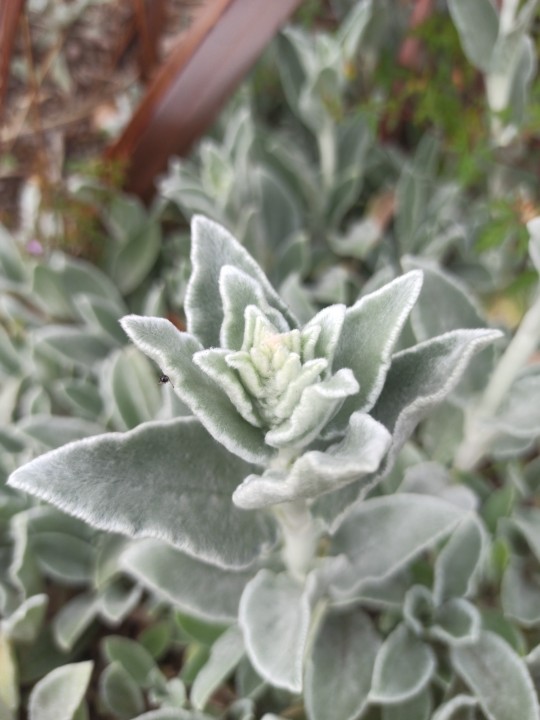
Stachys byzantina (syn. S. lanata), the lamb's-ear (lamb's ear) or woolly hedgenettle, Stachys lanata or Stachys olympica.
Чистец византийский — вид многолетних травянистых растений рода Чистец (Stachys) семейства Яснотковые.
native to Armenia, Iran, and Turkey.
Clade:Eudicots
Clade:Asterids
Order:Lamiales
Family:Lamiaceae
Genus:Stachys
In Brazil it is used as an edible herb, called peixinho-da-horta prepared battered and deep-fried sprinkled with lemon juice and said to taste fish-like. wool carder bee collects the fuzz from the leaves to use for making nests in decayed wood, bumble bees congregate in morning hours to collect the water condensation that has accumulated on the leaves.
Stachys byzantina extract has shown antimicrobial activity against Staphylococcus aureus that is resistant to vancomycin.
are used for the treatment of wounds, dysentery, epilepsy, digestive disorders, rheumatic disorders, and neuropathy. Infusions of dried leaves are good for colds, gum and throat infections, and asthma. Also, leaves simmered and cooled can be used as an eyewash for sties.
Due to its relatively high rate of evapotranspiration, Stachys byzantina is a potentially useful species for rainwater retention and therefore flood prevention.
Extremely easy to grow.
Совершенно удивительный пушистик.
Unnamed Road, Westgate, Auckland 0814
5JH6+9CG Auckland
-36.8215640, 174.6110640
наземные растения цветковые травы съедобные лечебные милые
0 notes
Text


lamb's ear (woolly hedgenettle), 2021
#lamb's ear#longwood gardens#woolly hedgenettle#hedgenettle#plant#botany#nature#plant photography#flowers
6 notes
·
View notes
Text



lamb’s-ear • woolly hedgenettle
#lambs ear#flowers#flower photography#flowercore#flowers of tumblr#flowering plants#plants#plantphotography#nature#naturecore#nature photography#cottagecore#fairycore#photography#photographers on tumblr#original content#original photography on tumblr#actualized latitude#mine
15 notes
·
View notes
Text
oh my god so my boyfriend and i came across a plant yesterday, the stachys byzantina or the woolly hedgenettle, and it has low-lying leaves that sprout tall purple flowers and the whole thing is covered in frosty-looking silver fuzz. the best part though? IT’S SO SOFT. it’s so incredibly soft, like touching actual velvet, that it’s more commonly known as lamb’s ear! best plant i’ve discovered in ages, we were completely fascinated by it!
here’s what it looks like (+ image credit):
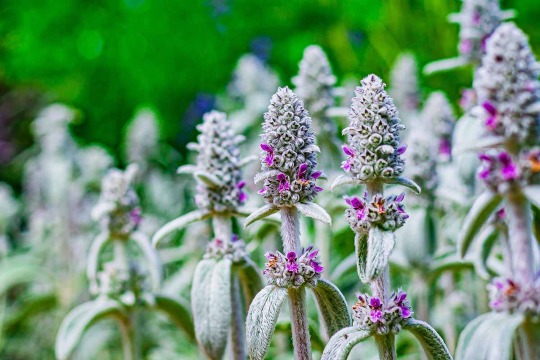
#i can’t stress enough the leaves feel heavenly#i love it so much#also it’s a plant in the mint family!#quill to paper#personal
9 notes
·
View notes
Photo

Hedgekit - Hedgepaw - Hedgenettle (she/her)
❄️ IceClan Snow Seeker
❄️ Woollysol’s niece
Hedgenettle is a black-and-white molly with soft fur. She wears a bushel of lamb’s ear granted to her by the Oracle.
She’s extremely confident in herself and her abilities, spurred on by her aunt’s constant enthusiasm. She knows she’s important to her Clan, and she will show it off. However, she’s not often rude about this, just confident. She’s the youngest of the seers, not counting Tansypaw, who’s still in training. Nicknames for her include Woolly Hedgenettle and Lamb.
#wc#warriors#warrior cats#wc oc#warrior cats oc#hedgenettle#seasons of the clans#iceclan#seasons bio#seasons art#my art
80 notes
·
View notes
Photo

Had this Red Admiral Butterfly pose for me on a piece of Lamb’s Ear aka Woolly Hedgenettle, a local cultivar which is actually a species of Stachys native to Turkey, Armenia and Iran. #naturesaturday (at Providence Bay , Manitoulin Island) https://www.instagram.com/p/CDXgvmSFaLH/?igshid=1ae2a4mgvioln
1 note
·
View note
Text
A Breath Held for a 1000 Years
Our story begins at the top of a hill. There is a church and a lonely girl in the pews. She lives next to the church, in a large house with a heavy door. The knocker is too high for her, as are the ceilings. Not even her father can graze his fingertips on their arches. The lonely girl, named Lily, likes to tap dance in the echoes. You’ll often find her checking corners and darting between mirrors, trying to catch the ghosts out.
Churches are built on hills because it places them closer to heaven. Their spires reach like arms into the sky: searching, longing. Lily sits with her knees together, tapping along the strict hem of her skirt. The vicar’s drone merges one sentence to another and Lily’s eyes stray to the windows. The stained glass casts a pool of blue across the heads of the congregation; Lily wants to stretch up and touch it. In the sunlight, the dust shimmers and dances and Lily dreams of the pond at the bottom of the hill, under the broad shadow of the willow tree.
Hundreds, even thousands, of years ago, there lived a kingdom in the willow. It was a kingdom of fairies, with a king and his queen. The queen was curious and full of ideas; she observed the running of the kingdom and often challenged her husband, but the king did not like this. He declared her every word dishonest and accused her of treason. Until she could be trusted, she was to be silenced indefinitely. She was banished to the bottom of the pond where her breath would be forever held. She fought against the water which sucked her down and ventured to climb the long stalks of the lily pads. However, when she surfaced and breathed once more, her throat was seized in excruciating pain. She clawed at her neck and chest and collapsed on the lily pad. The king turned her into a waterlily, pure and white, as a cruel reminder to anyone who dare defy him.
King, queen, and curse long forgotten, a new people have prospered in the pond. They have forgotten what lives at the surface, as the fairies of the Willow have forgotten what lives in the pond. They regard the stalks warily, because everyone knows the stories of those who dare to climb them: they never return. And for a hundred years, no has even touched the stalks.
Except Amelia. Amelia is the size of a fingernail, though if you asked her friends, they’d say she was tall. She moves with a gentle gait through the water, never causing more than a stir of grass to her side. She likes to lie atop the carpet of moss, staring up into dappled light where the great lily pads float and form patterns and pictures. It takes a little imagination: mostly they look like lily pads. She likes to venture out of sight and tease her palm over the waxy stalks, brushing each she passes. She thrills when they wobble slightly, momentarily wavering from the briefness of her touch. The sky (as she knows it) ripples and fractures, and for that moment it’s as if she could see through into whatever exists far, far beyond.
Once, a girl fell from the sky. Amelia had wandered and seen as the surface shuddered and cracked and down sunk a small, curled body. She’d watched in wonder and dread as the water pulled the body down...down...down...to settle only steps from where she was standing. Sand jumped where the body crumpled and the fog of algae flurried. Then all was still. A snail passed, indifferent, and the mare’s tail and milfoils curtained around her. Amelia advanced slowly. When her toes pressed into the freshly settled sand, she saw the set of wings, folded and draining of colour, against the girl’s spine.
The girl couldn’t use her wings; they dragged as she sat up. Instantly, she started to cry. Her small body heaved and sobbed as she felt over her chest, rubbed her eyes. Amelia, only a child herself, knelt beside the girl and tilted her head. The girl froze. Though Amelia was desperate to ask questions, she had the good sense to wait. So she signed her message of reassurance, but the girl only frowned: she didn’t understand. She strained her neck and pointed to her mouth, but Amelia didn’t understand that. They stared at one another in loss.
Amelia assigned her the symbol for angel and took her home. For weeks she cried, and the pond fairies ogled and gossiped. No one considered returning her, for that entailed climbing the stalks. No one could communicate with her and no one knew how to stop her wings from hurting. They were about the height of her, silver and silky, though they lost their shine and began to flake. The younger children would jump on the trail of them and only two months later they were skeletal and spoilt. Amelia gave Angel her bed and made a new nook in the mud. They lived in alcoves carved into the pond walls, held up by pebbles and cushioned with hornwort. At first, Angel refused to leave the spot she’d landed, staring hopelessly up into the sky. But as days passed, she grew fond of the pond’s mellow glow and muted sounds. Especially, she grew fond of the pond fairy who’d found her. Her name was the first sign language she learnt.
Together they tended to a bud of frogbit and by spring they were good friends. Now, years later, Amelia has grown restless. Neither friend nor family can do anything to quell her curious mind. She can’t comprehend why the girl who came from the surface seems so reluctant to return to it, to even talk about it. What could be so bad about the place Angel had lived? Amelia paces, tugging and twisting herself into bog bean, to pickerel weed, as Angel plays with the minnows and stickleback fish, feeding them quietly from her hands. She watches, drawing in the sand, as Amelia builds herself an astronaut’s suit. On the day she finishes, Amelia waits until nightfall before carefully dressing and sneaking out. She intends to return, but even so she delicately skims the spine of Angel’s wings, just lightly, where she’s sleeping. The algae is thick in the water so that the path disappears both in front and behind her. She continues on towards the stalk she’s selected: sturdy, and easy to wrap her arms to. She’s adjusting her helmet when a burst of water rushes into her and Angel appears, sweet face serious and decisive.
Amelia had practiced, reaching as high as the length of a frog leg. But that isn’t very far, and by the height of two frog legs, Amelia’s exhausted. Her arms ache and the muscles in her legs twitch with complaint. Clinging by one arm, she signs down to where her friend is going red with effort. The image of her mother swims into her mind. She’s begun doubting the mission when a small hand circles her ankle and squeezes. Angel smiles. The stalk sways, precarious, and the pond floor looms beneath them, but Angel could never deny a dream. They move in slow tandem and soon the lily pads are ginormous. Amelia won’t look down, only up. Her heart thumps erratic.
The moon is a strange and glorious thing when Amelia sees it. Her feet slip on the lily pad and she stumbles into its flower, only to stumble back in fright and awe. There’s more, dignified and majestic, and- oh, what’s that? A breeze tumbles into her, invisible, though she tries to grab it. Her eyes follow where it seems to snake and there she’s met with a dense wall of flora, leading up, up – everything is humungous – to a waterfall of green, held by nothing but shadows. The air makes her feel off-balance. Giddy, she flaps her arms.
Angel surfaces behind her, scrambling for purchase on the lily pad. It feels different to hold hands, up here. They sit and stare and Amelia stares at Angel. She glances to her wings, tattered and wilted. Amelia hesitates to move at all, but Angel stands and stretches. There’s a springtime sweetness in the air, she can smell it (the roses), and she can hear the birdsong twittering amid the fading stars (blackbird, robin.) Cautiously, she opens her mouth.
The night is clean and cool on her tongue. Her lungs expand and the first breath scurries in. She starts to laugh and Amelia’s heart falters. She’s never heard such a sound. Angel drops to her knees and rests her forehead on Amelia’s helmet. She speaks her name. She stutters, so repeats it clearer. Amelia’s eyes form perfect reflections of the moon. Di- Didi- The dawn warms around them. Giddy, Amelia grabs her helmet and Didi assists. Water gushes down them as she eases the helmet from her head. Didi bites her lip and Amelia feels for the strength to part her mouth.
She wheezes and is suddenly gripped in searing pain. Didi watches in horror as Amelia panics, clutching her chest which feels like being stabbed with daggers with each intake of air. A terrible, low sound of anguish leaves her throat and she keels over in agony. Didi hushes her, strokes the wet strands of her hair, but the pain only worsens. She retrieves the helmet and manoeuvers it back into place, but the water is gone. She plunges them into the pond but Amelia writhes in her arms. Tears roll onto Didi’s cheeks and after a moment’s hesitation, she hops from frogbit to crowfoot, racing to shore. Amelia drifts with the waterlily, confusing, hot water springing to her face.
The morning is mocking. Didi whispers to Amelia which flower she can smell, which bird she can hear, but the soothing trace of her fingers does nothing to relieve the tension in Amelia’s brow, how her eyes squeeze shut and miss the daylight. Didi dries and her skin prickles with heat. Her hair feels scratchy against her neck and forehead; the pollen is itchy and the bumblebees buzz buzz buzz. Wide eyes had greeted her from the branches, tip-toeing out into the early morning, flanked by firefly. Her mother looked out to investigate the commotion and gasped upon seeing her daughter. They heaved the lily pad to the bank, but no fairy could cure Amelia. They carry Amelia inside the hollow and Didi sources the softest woolly hedgenettle for a blanket. Even so, Amelia trembles.
Her mother stays with Didi by Amelia’s bedside, mournfully caressing her broken wings. Didi asks why she hadn’t been hurt the same. Her mother explains that when she disappeared, her father had been heartbroken. The Willow assumed she’d run away for good, and if not that, she was dead. Didi tells her she had simply fallen. (All the Willow know that a fairy fallen won’t return: that’s the rumour that keeps them at bay from the pond.) Her father died of a broken heart, consumed by regret. Didi isn’t just the lost princess; Didi is the queen now. The curse wouldn’t touch the rightful heir to the throne. Didi begs: I have to help her. The queen mother holds her closer and bends to kiss her curls.
The grass is lovely as Lily pulls her socks off, skipping down to the water’s edge. With her back to the willow, she wriggles her toes and closes her eyes. All had appeared well, but the birdsong is frantic and the leaves rustle with whisperings. A lone pond skater darts out, agitating the water. Noticing a caterpillar crawling up her leg, she scoops it onto her finger and holds it to the bridge of her nose. She implores it to tell her what’s wrong. The caterpillar twists beneath her finger, unresponsive. Thinking hard, Lily springs to her feet, brushing off her skirt.
As a little girl, she’d been convinced of fairies. Maybe she’d seen one, spying down on her from the boughs of the willow, and ever since the tree had given her hope. How she loves the tree and all its possibilities. Running back, breathless, she presses her lips to the miniature sail and shyly places the boat on the pond. Maybe they need to reach someone. Maybe, just maybe, she thinks, and though she doesn’t like the size of her hand, or her shadow, towering over this tiny world, she can’t resist giving the boat a nudge, marvelling at how much better it looks here than on a shelf. The water kisses her wrist. She doesn’t return to the top of the hill before she faints.
Seasons pass and Amelia lies witness to colours she could never have imagined: to scents, to sounds, to blackberry juice. Didi’s hands, blood thrumming through her veins, introduce her to stars, to corncockle, kingcup. To yarrow, foxglove and forget-me-nots. Ladybugs, beetles, and swans. Winged-creatures that make her sad because where Didi crouches, her own wings droop towards the deck. The small copper, the small white; holly blue and meadow brown. Damselflies, dragonflies, mayflies. Spider webs caught in the dusk between Queen Anne’s lace. Amelia is dying. Didi steers though she doesn’t have a destination more than the sea, nor any direction more than the sun. Amelia tries to speak, by hand or mouth, but she’s too weak. They follow the water and Amelia cloud-gazes.
Threadbare branches guide them to river. Winter leaves bleed over its surface as the water shallows. There’s a smell of salt and a white noise, somewhere distant... The wind knocks through their bones and Didi staggers against it for Amelia, whose skin is sallow with sweat. She arranges Amelia’s limbs on her back. The clouds sink low, erasing each sharp edge and angle. A crow smudges black across the grey. Amelia is incoherent and faint as she sips meekly from the air. Still each breath cuts torturously into her. Didi walks in human footprints, scanning the horizon until the sea swells, beautiful as it is endless.
The waves are deafening, colliding violent and formidable with the shore’s spears and shields. Didi trips over shell and shingle, spilled guts of seaweed and net. Taking rest by a rock pool, she hugs Amelia tighter: she dangles limp between her knees. A crab glares at them from across the simmering water; below, a starfish stirs. If rumours are to be true, her mother suggested, the sea witch could save her. Amelia’s breath condensates before Didi, fragile in the heartbeat it takes to be swept away by the wind. The sea laps at the land, inching closer and closer. What now?! Didi cries, letting her tears skate down Amelia’s arm. She buries her head and Amelia’s fingers quiver to reach her.
It is then that one, two, grey rocks open their eyes. Didi startles, but the seals are patient. Perhaps they aren’t even observing her and her friend. They are, after all, not even the length of one of their whiskers. Yet the sense of recognition pierces Didi. The two seals shift towards the shoreline, where froth hurries to welcome them. They turn back, expression dull and undefined. Didi’s weeping subsides: the sea beckons.
Rain begins to slant into Didi’s vision. She moves without feeling and allows herself to be swallowed. Her world spirals and she is nothing more than a grain of sand, a lost feather, flotsam, when all in one heaving breath the sea calms. Her ears hum from inside the belly. Peeking open a single eye, she discerns her surroundings. She’s cradled by a pair of hands: pearlescent fingers. Amelia is gone. Leaping to standing, she peers through the gaps. Amelia is nestled in another palm, accelerating forward at a pace that appears motionless. Quite forgetting her situation, her body flushes in alarm. However, there is no pressure to hold her breath, nor a force holding it for her. Tentatively searching her neck, she discovers the gills transformed there. Leaning into the hands that saved them, Didi blinks across to her friend, to Amelia, who for once slept soundly.
The sea parts clumsily and Didi rouses. The hum is sharper in her skull and they have slowed so that Didi can see the tiny, speckled fish shying backwards. It’s so dark, Didi can’t decipher plant from animal. It feels as though a hundred eyes stare at them. Jellyfish slide in and out of the murk; a seahorse slinks into a crevice. Then the fingers open and Didi is left suspended. Amelia joins her blearily. Didi barely catches the flicker of tail abandoning them.
Didi extends her arm. Amelia smiles, tired, but familiar again, and envelopes Didi’s hand in hers. The ocean is overwhelming as it digests their presence. Its greatness weighs down on their skeletons, bleakness all-encompassing. Their ears throb with the pressure. All that can be heard is the shared pulse booming along their veins. Didi knows they are waiting, when suddenly they’re engulfed in the throat of one deep, awful moan. It vibrates, coiling around them. Light vanishes, snuffed at every source. It’s a darkness Didi has never experienced. The water freezes and they freeze with it. A whirlpool licks at their feet and they grasp hands firmer.
HshhhhI know why you’re here.
A flash of wet body.
I hear...through the water. HshhhhYou seek to break the curse.
HshhhhThe curse...of the Willow king.
Didi shrinks from the thunderous voice. It circles closer, though Didi cannot isolate the source. A long, long tentacle whips in and out of sight.
She whose voice cannot be trusted shall be silenced. She who should hold her tongue shall now hold her breath.
HshhhhTo break this...you must be true. Express a truth else...Amelia...can never return.
The words echo. There’s a mighty expansion of breath. The water shivers and settles. The witch towers above them, awaiting answer. Amelia holds Didi at arm’s length. Her eyes bloom with sorrow, the Angel who’d fallen reflected in her tears. She thinks of her mother, of the Willow queen; she thinks of Didi and the harm that could befall her. Amelia doesn’t trust the sea witch. She grazes fingertips up one sodden wing, brings her thumb to hover along Didi’s lower lip. Didi stares, hypnotised. Swiftly, she kisses her. Didi reaches after the kiss, opening her eyes to see Amelia signing: save yourself.
Didi refuses, shaking and shaking her head. She’d stay with Amelia; she’d live, speechless, in the ocean forever if they failed. But Amelia gestures desperately. For Didi, it was easy, it was obvious. She draws the image of I love you. The confession strikes Amelia by the heart, ricocheting splinters of joy, grief. Believing Didi to have relented, for this to be their goodbye, Amelia smiles and mirrors her words: I love you. Didi beams, thinking herself oh-so clever, for this is Amelia’s truth. The gills retract from Amelia’s neck.
Amelia flounders. She can’t breathe; she needs to breathe. She gurgles hideously, eyes wide with terror. The water caves as the witch winds down, deep, deep into the abyss. It’s all Didi can do to keep Amelia with her; gravity drags against them, inciting a whirling storm of water. How the sea witch tricked her. The curse had lifted, but thousands of feet below surface, Amelia would now drown. Didi tries to swim, a speck of life within the vast blankness. Amelia reddens and slips unconscious, absent and empty where she sags. Didi feels smaller than ever, the weight of Amelia turning lighter and lighter. Didi never wanted to be queen; she’d never wanted to be responsible.
Her lungs burn. She’ll never make it to surface in time. Silently screaming, the burning intensifies. Every muscle tenses, her eyes clench. A bubble forms from inside her mouth and inflates out from her silence. It grows up, up and around them, securing them safe from water. She’s too heartbroken to be surprised by her power. She collapses into Amelia, hoping, praying, maybe, just maybe...
The bubble pops. The waves catch them and carry them to shore. Didi wraps Amelia in her arms and struggles over the rushing, rolling pebbles. Groaning aloud, gasping, Didi fails to realise she’s flying when her wings stutter to action. Wrecked and feeble, they cannot sustain flight for more than seconds, and can only lift them mere centimetres from the ground. She crashes, bloody knees, scraped and bruised, where the sand is wet. The sea withdraws; the two seals watch. The Willow fairies dive one after another into the pond; the lily pads shake violently. Lily wakes, feverish, dazed, to her father, crying into his handkerchief. She calls to him and he chokes on his breath, grabbing her hands to kiss them. How much he missed her voice.
A woman on a beach stands back from the sea foam. She coughs, naked and forgetful. She sees two seals on a rock; she hears ringing in her ear. She must be hallucinating, for there looks to be a fairy, right there – right there – in front of her.
0 notes
Text

Do you mean perhaps The Vegetable Lamb of Tartary? My Father described it in his Magnes sive de arte magnetica. I have heard that extracts from it can be useful as a prophylactic against thinning of the bones.
If you are referring to the somewhat more banausic woolly hedgenettle, however, I have heard that if deep fried and seasoned with lemon, it can make a passable substitute for fish, and has at times been used to make a poultice to promote the healing of wounds or as a topical treatment for piles.
Up late once again, doing research on various medical practices. Does anyone know, pray tell, if lamb's ear has any good use in medicine ? I've discovered a large plant of it in my yard recently, which is strange since it doesn't commonly grow in my country.
#magnes sive de arte magnetica#vegetable lamb of tartary#lamb's ear#Peixinhos da horta#Stachys byzantina#Cibotium barometz
8 notes
·
View notes
Text
Answering the Myth: Is the Lamb’s Ears Plant Poisonous?
Stachys byzantina, also known as Lamb’s Ears plant or woolly hedgenettle, is a herbaceous perennial with soft, velvety silver foliage growing 12” – 18” inches ... [Read more]
The post Answering the Myth: Is the Lamb’s Ears Plant Poisonous? appeared first on Plant Care Today.
source https://plantcaretoday.com/lambs-ear-plant-poisonous.html
0 notes
Text
i picked a leaf of lamb's ear and it is SO SOFT i am LIVING
2 notes
·
View notes